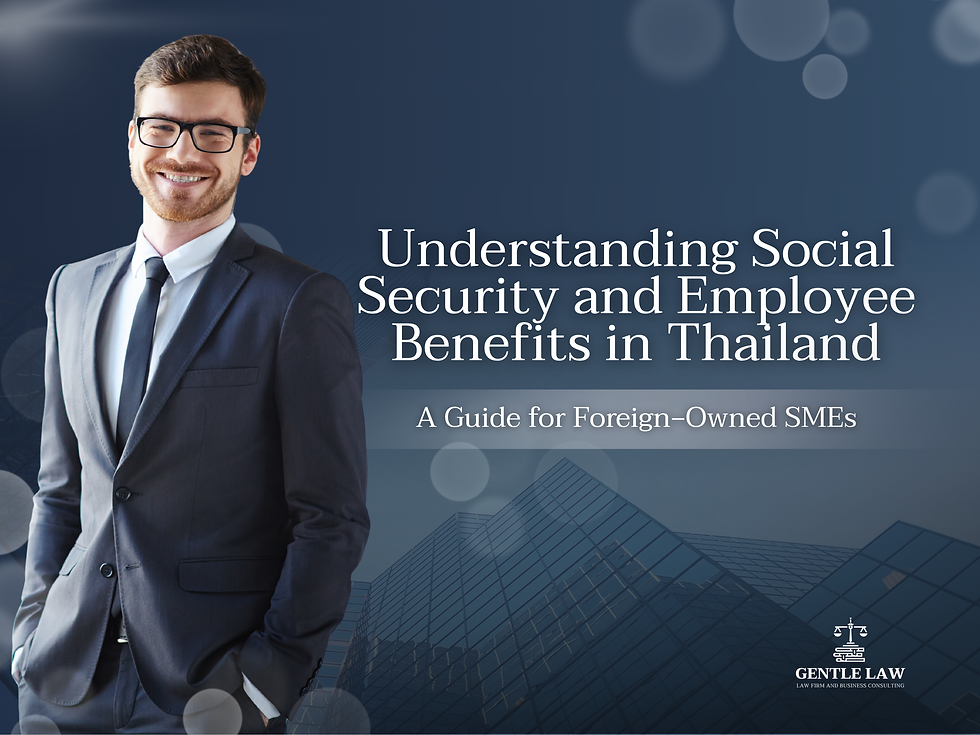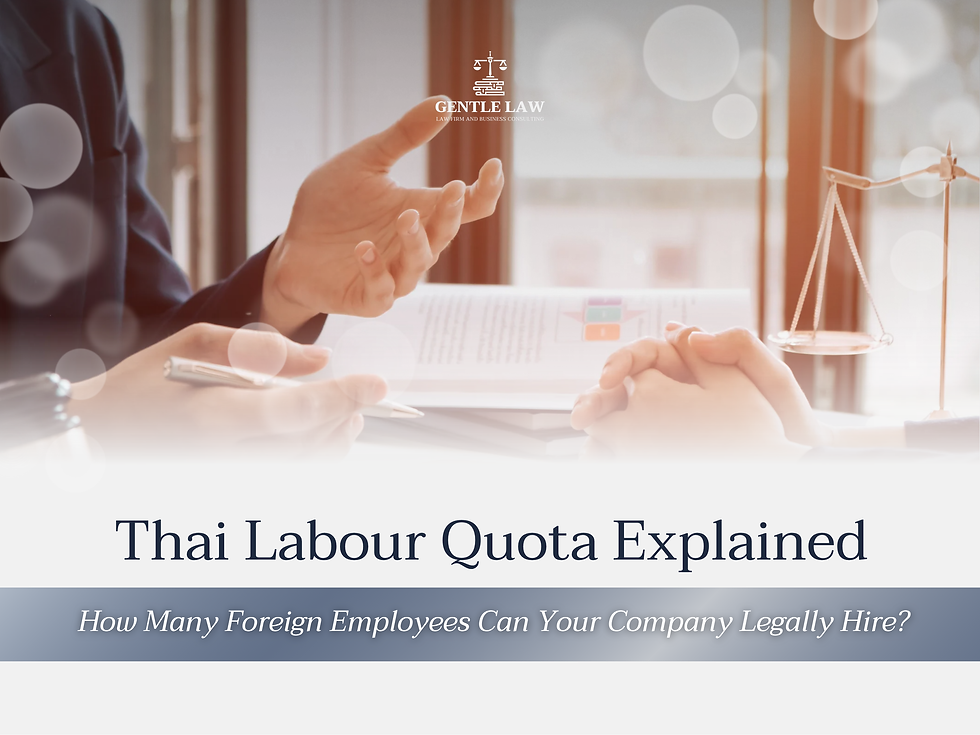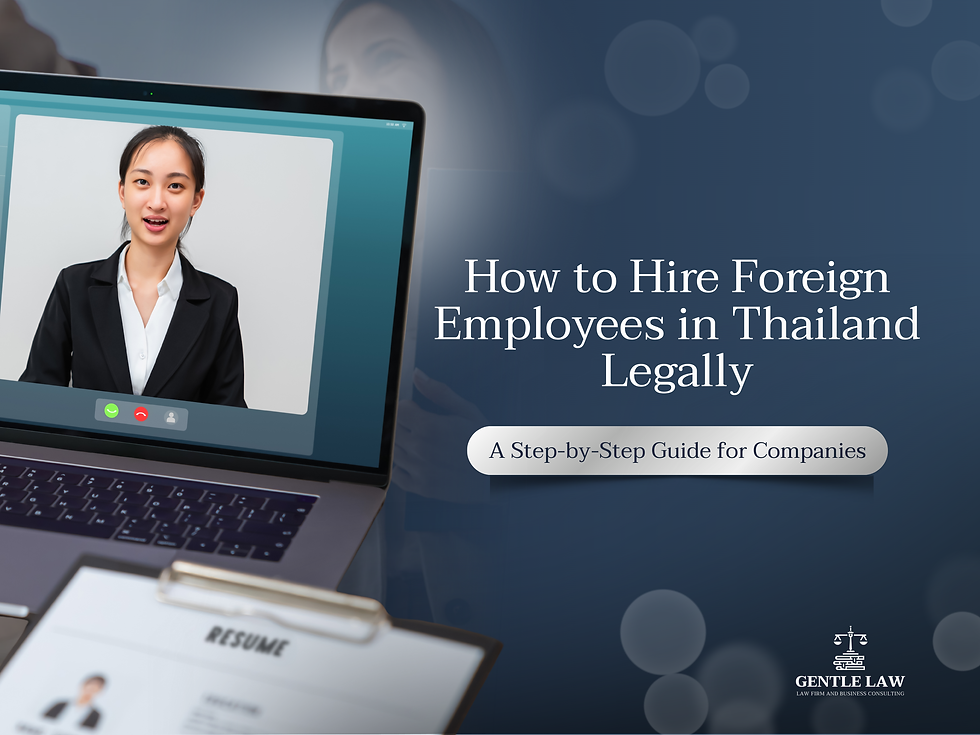Understanding Social Security and Employee Benefits in Thailand for Foreign-Owned SMEs
- gentlelawlawfirm
- Jul 31, 2025
- 3 min read

Introduction: Why Social Security Compliance Matters
Navigating social security in Thailand for foreign SMEs is a legal requirement—not just a best practice. Under the Social Security Act B.E. 2533 (1990), all employers operating in Thailand must register eligible employees with the Social Security Office (SSO). Failure to comply can lead to fines, penalties, employee dissatisfaction, and reputational damage.
GENTLE LAW IBL provides this guide to help foreign-owned SMEs understand their legal obligations and adopt best practices for managing social security and employee benefits effectively.
Who Must Be Registered Under Thai Law?
Registration with the SSO is mandatory for the following employee categories:
Thai nationals employed full-time
Foreign nationals legally employed under a valid Thai work permit
Part-time employees who:
Work more than 3 days per week, or
Earn over THB 1,650 per month
❗ Exemptions:
Casual workers or day-laborers hired irregularly
Domestic helpers under a specific income threshold
Foreign employees covered under bilateral social security agreements (e.g., Japan and South Korea — check with the SSO or BOI for updates)
Per Section 33 of the Social Security Act, employers must submit registration within 30 days of employment commencement.
Mandatory Social Security Contributions in Thailand
Contributions must be submitted monthly to the SSO. Rates are:
Participant | Employee Share | Employer Share | Government Share |
Standard Rate | 5% of salary | 5% of salary | 2.75% of salary |
Salary Cap: THB 15,000/month for calculation purposes
Maximum monthly contribution: THB 750 for both employer and employee
Remittance deadline: By the 15th of the following month
Failure to remit on time is subject to a penalty of 2% per month plus surcharges. Contributions are governed by Ministerial Regulations issued under the Social Security Act.
What Benefits Do Employees Receive Under the Thai Social Security System?
Benefit | Eligibility | Funded By |
Medical care | All registered employees | Social Security Fund |
Sickness allowance | > 3 days sick leave with doctor’s note | SSO |
Maternity leave | Female employees (up to 90 days) | SSO |
Disability pension | Permanent disability | SSO |
Unemployment benefit | Job loss with 6+ months contributions | SSO |
Old-age pension | ≥ 180 months of contributions | SSO |
Child allowance | Max. 3 children per employee | SSO |
Benefits under Social Security in Thailand for foreign SMEs and Thai employers alike are non-negotiable—employers cannot opt out or replace them with private insurance.
5 Common Pitfalls in Social Security Compliance (and How to Avoid Them)
Pitfall | Recommended Legal Solution |
Failure to register within 30 days | Add to onboarding checklist and register promptly |
Underreported salary | Use certified payroll software; conduct annual audits |
Late payment of contributions | Enable auto-debit payment from bank |
Misclassification of foreign employees | Verify work permit and bilateral treaty status |
Ignoring required notifications to SSO | File Form SSO 6-09 within deadline after resignation |
Each violation can result in penalties of THB 20,000–100,000 per the Administrative Penalties Section of the Act.
Best Practices to Manage Social Security in Thailand for Foreign SMEs
Digitize HR and SSO integration: Use digital payroll systems linked to SSO e-services.
Train HR personnel: Ensure all staff understand statutory benefits and SSO procedures.
Communicate benefits clearly to candidates: Enhances recruitment and retention.
Annual legal and payroll audit: Verify correct contribution records and identify risks.
Explore optional benefits: Supplement SSO coverage with provident funds or group insurance.
At GENTLE LAW IBL, we often recommend pairing legal audits with payroll health checks to reduce legal and financial exposure.
Summary & Compliance Checklist
Task | Completed? |
Register all eligible staff with the SSO | ☐ |
Set up monthly contribution mechanism | ☐ |
Accurately report all salary data | ☐ |
Maintain full documentation & notices | ☐ |
Conduct annual audit for compliance gaps | ☐ |
Let GENTLE LAW IBL Support Your Compliance
Managing Social Security in Thailand for foreign SMEs is more than paperwork—it protects your workforce and safeguards your operations. GENTLE LAW IBL provides:
End-to-end employee registration & deregistration
Monthly contribution filings and payroll audits
Advisory on social security audits and voluntary benefits
👉 Book a Social Security Compliance Review today at www.gentlelawibl.com to ensure your team stays happy, healthy, and 100% compliant.



